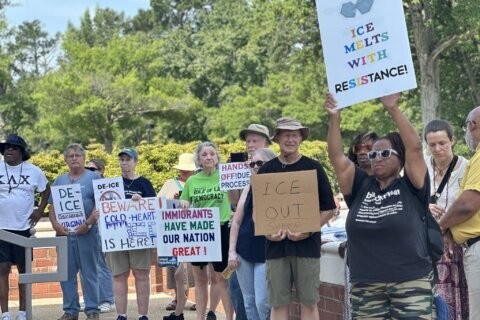WASHINGTON — Federal prosecutors may apply a rarely-used section of the U.S. Code to seek the death penalty for hate crimes against the Ohio man charged with driving a car into a crowd during last summer’s white nationalist rally in Charlottesville.
James Alex Fields, 21, was indicted by a federal grand jury in the Western District of Virginia on 30 civil rights charges, including two in connection with the death of counter-protester Heather Heyer, who was killed during the Aug. 12 Unite The Right rally in downtown Charlottesville.
One of the charges against Fields makes him eligible to be executed.
Twenty-nine charges of “Hate Crime Act Involving Attempt to Kill” list injured victims by initials.
Online court records show Fields is set to be arraigned Thursday afternoon, July 5, before Magistrate Judge Joel Hoppe.
After announcing the indictments Wednesday, U.S. Attorney Tom Cullen said it is not yet clear whether federal prosecutors will seek the death penalty, and whether Fields will be prosecuted first for the state-based murder charge, or the federal hate crime charges.
“That remains to be seen — they will proceed on separate but parallel tracks,” Cullen said. “Mr. Fields will come into federal custody — probably early next week — he’ll make an initial appearance, then we’ll be subject to a scheduling order, and I’m sure there will be extensive coordination” between federal and state prosecutors.
Of the two counts related to Heyer’s death, the maximum penalty for “Hate Crime Act Resulting in Death” is life in prison, but federal prosecutors also charged Fields with “Bias-Motivated Interference with Federally Protected Activity Resulting in Death,” which can be punishable by death.
“It is a less-common charge,” said John Gore, acting assistant attorney general for the Department of Justice’s civil rights decision. “It’s an older civil rights statute, that was part of the Civil Rights Act of 1968.”
In addition to proving there was a bias motivation and that the defendant acted by the actual or perceived race of the crowd, “there’s an additional requirement that the defendant was motivated by the victim’s use of a state facility, which in this case would be the streets and sidewalk, here in Charlottesville,” said Gore.
Cullen said the process of determining whether federal prosecutors will seek the death penalty “is a well-established and rigorous process.”
“It is coordinated by the capital case unit at Department of Justice — career prosecutors who review potential death penalty cases from across the country,” said Cullen.
“They seek input from prosecuting jurisdictions, the victim’s family, and ultimately it’s presented to the Attorney General (Jeff Sessions) who has ultimate authority as to whether the department will seek the death penalty or won’t.”
In a statement, Charlottesville commonwealth attorney Joseph Platania said his office “has been continuously updated on the status of this federal investigation,” and said it “has no effect on the state charges currently pending against Mr. Fields.”
Asked if he preferred to prosecute Fields first, Platania did not immediately respond.
Fields’ local defense attorneys also did not return requests for comment.








